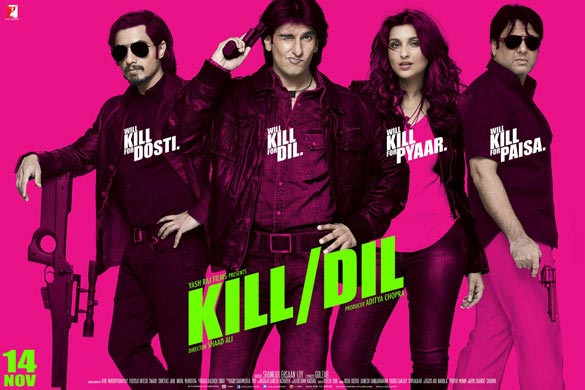In one scene, he is asked, “Kabhi hua hai? Pyaar, ishq, mohabbat, love?” He says, “Nahin bhaiyya ji, chaaron hi nahin hua!” And you see a glimpse of the wonderful scene stealer he could have been but he meets his end just the way the film does. Abruptly. Pointlessly.
In retrospect, the film is like an empty barsaati that Shaad Ali perhaps wanted to decorate with all the sounds, sights and memories of his formative years. So he ran through memorabilia stores and memory chests and there was the poster of the Marlboro man. Then the yellow suit Uma Thurman wore as she hunted for Bill. Jai and Veeru reborn as Dev and Tutu. Dev as the Awara who just wants to be loved by a good woman.
A picture of Nirupa Roy on a wall. Mr Sanskari Alok Nath himself in flesh and blood. And not just the poetry of Gulzar saab but his voice! Oh dear god, Gulzar saab’s voice thundering through the hall almost as if god himself was saying, “koi atka hua a pal shayad,” as Ranveer Singh digs out a gun he had once buried for good.
The point of it all? Well, who are we to question the director who gave us Jhoom Barabar Jhoom? A film that was so excessively self-indulgent that it took you to Paris for a song that was called Ticket to Hollywood and had Amitabh Bachchan dressed as Jack Sparrow dancing for no particular reason in a London train station. Here too after a rather nice proposal scene atop what looks like Qutub Minar, we are suddenly jolted into a surreal romantic song where the hero and the heroine carry smart suitcases and are on their way some place. That in a nutshell is a metaphor for this film and perhaps the kind of cinema Shaad Ali seems to love. A cinema that lives in many rainbow bubble moments but never becomes a rainbow. And never seems to go anywhere.
Post an almost Jessica Lal like episode, the young woman Disha (Parineeti Chopra in designer wear) and Dev grow close. They meet in places he has never been to. At plays, in a swanky terrace apartment, bungalows dripping Diwali lights and old money and he suddenly begins to want to reform and become the boy Disha thinks he is. There are a few genuinely funny moments as when Dev and Tutu try to decipher the meaning of LOL and ROFL. The jewellery store sequence is hilarious too where the boys are bargaining over a birthday gift with the owner at gunpoint.
Dev and Disha’s romance has some nicely etched moments too but overkill takes over their awkwardly sweet chemistry with sudden songs. A perfectly intimate birthday party suddenly turns into a flash mob dancing with a million birthday cakes. In the end, it all gets excruciatingly tiresome though the performances are uniformly good. Govinda whom you expected to romp home with the film almost does but his role is mainly limited to loud laughter, breaking into signature steps, handing out photographs of people he wants bumped off and smirking at his own jokes. An actor of his stature deserved more.
 with The New Indian Express
with The New Indian Express






